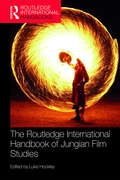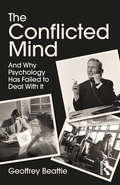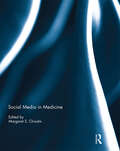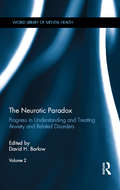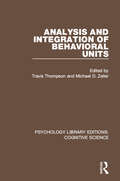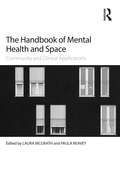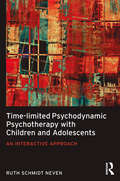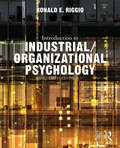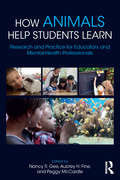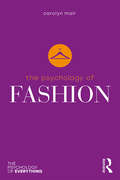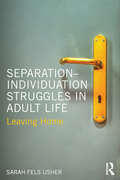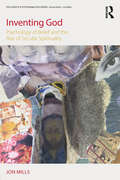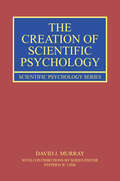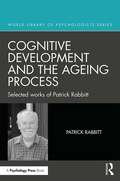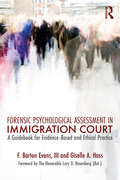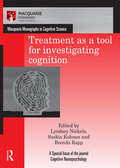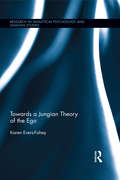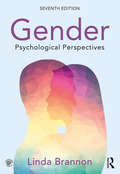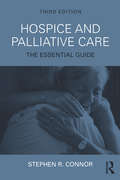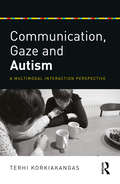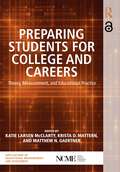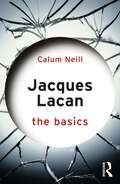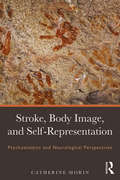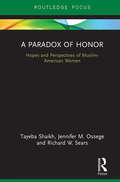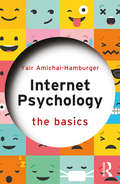- Table View
- List View
The Routledge International Handbook of Jungian Film Studies (Routledge International Handbooks)
by Luke HockleyThe Routledge International Handbook of Jungian Film Studies weaves together the various strands of Jungian film theory, revealing a coherent theoretical position underpinning this exciting recent area of research, while also exploring and suggesting new directions for further study. The book maps the current state of debates within Jungian orientated film studies and sets them within a more expansive academic landscape. Taken as a whole, the collection shows how different Jungian approaches can inform and interact with a broad range of disciplines, including literature, digital media studies, clinical debates and concerns. The book also explores the life of film outside cinema - what is sometimes termed ‘post-cinema’ - offering a series of articles exploring Jungian approaches to cinema and social media, computer games, mobile screens, and on-line communities. The Routledge International Handbook of Jungian Film Studies represents an essential resource for students and researchers interested in Jungian approaches to film. It will also appeal to those interested in film theory more widely, and in the application of Jung’s ideas to contemporary and popular culture.
The Conflicted Mind: And Why Psychology Has Failed to Deal With It
by Geoffrey BeattieOne of the greatest paradoxes of human behavior is our tendency to say one thing and do something completely different. We think of ourselves as positive and fair-minded, caring about other people and our environment, yet our behavior lets us down time and time again. Part of the reason for this is that we may have two separate 'selves': two separate and dissociated mental systems - one conscious, reflective and rational, and one whose motives and instincts are rooted in the unconscious and whose operation resists reflection, no matter how hard we try. In all kinds of areas of our life – love, politics, race, smoking, survival - one system seems to make very different sorts of judgements to the other, and is subject to distinct, hidden biases. The Conflicted Mind explores how and why this system operates as it does and how we may use that knowledge to promote positive behaviour change. However, the ‘conflicted mind’ is a broader concept than just the clash between potential (hypothetical) systems of thinking, because in one form or another it forms the very pillars on which the edifice of social psychology is built. This unique book therefore examines key social psychology theories and research in a new light, including Festinger’s concept of cognitive dissonance, Milgram’s obedience experiments, Bateson’s description of conflict in communications, and Bartlett’s explorations of the constructive nature of human memory. Geoffrey Beattie argues that although these classic studies were sometimes great and imaginative beginnings, they were also full of flaws, which social psychology must remedy if it is to make the kind of impact it aspires to. In doing so, he offers a ground breaking perspective on why we think and act in the way we do, to see what lessons can be learned for the discipline of social psychology going forward. Written in the author’s distinct open and engaging style, The Conflicted Mind is a fascinating resource for researchers, specialists, and students in the field, as well as the general reader.
Social Media in Medicine
by Margaret S. ChisolmThe use of social media around the world has exploded in recent years, with the number of monthly active users of Facebook and Twitter estimated to be one billion and one quarter billion, respectively. Physicians and medical trainees are among the users of social media, raising questions of how Facebook, Twitter, and other novel online tools may best be harnessed to further medical research, patient care, and educational pursuits. Because social media enables an immediate exchange of information and ideas around shared areas of interest, it has fostered communication and collaboration among a global network of researchers, clinicians, patients, and learners. Social Media in Medicine reviews a range of topics, from research ethics to medical education, and includes personal reflections by clinicians and learners that represent diverse opinions about the role of social media in medicine. The book is relevant to all healthcare stakeholders and will hopefully encourage ideas and questions to generate more research into the use of social media in medical research, patient care, and education. This book was originally published as a special issue of the International Review of Psychiatry.
The Neurotic Paradox, Vol 2: Progress in Understanding and Treating Anxiety and Related Disorders, Volume 2 (World Library of Mental Health)
by David H. BarlowThis collection of David H. Barlow‘s key papers are a testimony to the collaborative research that he engendered and directed with associates who now stand with him at the forefront of experimental psychopathology research and in the treatment of anxiety and related disorders. His research on the nature of anxiety and mood disorders resulted in new conceptualizations of etiology and classification. This research led new treatments for anxiety and related emotional disorders, most notably a new transdiagnostic psychological approach that has been positively evaluated and widely accepted. Clinical psychology will benefit from this collection of papers with connecting commentary.
Analysis and Integration of Behavioral Units (Psychology Library Editions: Cognitive Science #25)
by TRAVIS THOMPSON AND MICHAEL D. ZEILEROriginally published in 1986, this volume was the result of a conference in honor of the 65th birthday of the late Kenneth MacCorquodale, an exceptionally eloquent spokesman for the field of experimental analysis of behaviour at the time. The present volume grew directly out of the issues raised by MacCorquodale and Meehl in their "Excursis: The Response Concept" paper and which MacCorquodale posed so often when he taught. It is a fitting tribute to the man on his 65th birthday that a group of scholars whom he held in the highest regard convened in one place to think out loud about two of the thorniest problems facing behavioral science, namely, the nature of the units of analysis of the subject matter and the mechanisms responsible for their integration.
The Handbook of Mental Health and Space: Community and Clinical Applications
by Paula Reavey Laura McGrathThe Handbook of Mental Health and Space brings together the psychosocial work on experiences of space and mental distress, making explicit the links between theoretical work and clinical and community practice. The change from an institutional to community care model of mental health services can be seen as a fundamental spatial change in the lives of service users, and the book aims to to stimulate discussion about mental healthcare spaces and their design.With contributions from those involved in theorizing space, those drawing on their own experiences of distress and space, as well as practitioners working on the ground,the book will be of interest to mental health practitioners and academics.
Time-limited Psychodynamic Psychotherapy with Children and Adolescents: An interactive approach
by Ruth Schmidt NevenAt a time when there is increasing concern about the escalation of child and adolescent mental health problems, Time-limited Psychodynamic Psychotherapy with Children and Adolescents provides an innovative contextual model that engages the child or young person and their parents. The core of the model is the recognition of the dynamic capacity for growth in the child and how this, in itself, creates opportunities for effective treatment over a relatively short period of time. Based on evidence that the most enduring therapeutic outcomes involve a shift in the parents’ relational understanding of themselves, as well as a change in the child, the book uses case examples to show how this model can be applied in everyday therapeutic practice. Time-limited Psychodynamic Psychotherapy with Children and Adolescents is aimed at practitioners in the field of child, adolescent, parent and family psychotherapy. It will interest psychologists, child psychotherapists, doctors, psychiatrists, social workers and mental health workers.
Introduction to Industrial/Organizational Psychology (Seventh Edition)
by Ronald E. Riggio<p>Introduction to Industrial/Organizational Psychology provides an accessible approach to psychological theory and its applications to the world of work. Using both classic theories and research along with the latest developments and innovations, this student-centered text shows practical applications of theoretical concepts using examples from work situations that students may be familiar with—such as service industries, internet companies, and startups—in addition to traditional office and factory work settings. Each chapter includes key terms and review questions, and the text features special sections highlighting applications of I/O psychology theories, psychological approaches to everyday work situations, and current areas of research and practice. <p>The seventh edition is thoroughly updated to include the latest research on each key topic. It also includes expanded coverage of international issues, job engagement, and emerging topics in the field, such as workplace bullying, virtual teams and organizations, agile organization structures, and web-based training and assessment. The book will be of interest to undergraduate students in introductory I/O psychology or psychology of work behavior courses. <p>For additional resources, please consult the Companion Website at www.routledge.com/cw/riggio, where instructors will find an expanded instructor’s manual, test bank, and lecture slides, and students will find chapter summaries and learning objectives.</p>
How Animals Help Students Learn: Research and Practice for Educators and Mental-Health Professionals
by Nancy R. Gee Aubrey H. Fine Peggy McCardleHow Animals Help Students Learn summarizes what we know about the impact of animals in education and synthesizes the thinking of prominent leaders in research and practice. It’s a much-needed resource for mental-health and education professionals interested in incorporating animals in school-based environments, one that evaluates the efficacy of existing programs and helps move the field toward evidence-based practice. Experts from around the world provide concrete examples of how animals have been successfully incorporated into classroom settings to achieve the highest level of benefit while also ensuring the health and welfare of the students and animals involved.
The Psychology of Fashion (The Psychology of Everything)
by Carolyn MairWhat do our clothes say about us? How do the clothes we wear affect our moods and emotions? How does the fashion industry encourage us to aspire to look in a certain way? The Psychology of Fashion offers an insightful introduction to the exciting and dynamic world of fashion in relation to human behaviour, from how clothing can affect our cognitive processes to the way retail environments manipulate consumer behaviour. The book explores how fashion design can impact healthy body image, how psychology can inform a more sustainable perspective on the production and disposal of clothing, and why we develop certain shopping behaviours. With fashion imagery ever present in the streets, press and media, The Psychology of Fashion shows how fashion and psychology can make a positive difference to our lives.
Separation-Individuation Struggles in Adult Life: Leaving Home
by Sarah Fels UsherSeparation-Individuation Struggles in Adult life: Leaving Home focuses on the developmental task of separating from parents and siblings for individuals and couples who have not been able to resolve these issues earlier in life. Sarah Fels Usher extends Mahler’s theory, and includes the writing of Loewald and Modell, among others, stressing the right of adult patients to a separate life. She describes the predicament of Oedipal victors (or victims), their introjected feelings of responsibility for their parents, and their resultant inability to be truly individuated adults. Difficulties separating from siblings are also given analytic attention. Usher’s experience treating couples adds a new and powerful dimension to her theory. She is optimistic throughout about the therapist’s ability to help adult patients resolve the rapprochement sub-phase in a satisfying manner. An additional, crucial question is raised when the author asks if the therapist can allow the patient to terminate treatment. Has the therapist achieved separation from their own parents—or, indeed, from their analyst? Exploring the plight of patients of the unseparated analyst, Usher describes how these generational factors rear their unfortunate heads when it is time to end therapy. Listening to patients from the perspective of separation-individuation is not new; what is new is Usher’s emphasis on how these particular issues are often masked by significant achievement in adult professional life. Separation-Individuation Struggles in Adult Life: Leaving Home will be of great importance for psychoanalysts and psychoanalytic psychotherapists working with adults, as well as for clinical postgraduate students.
Inventing God: Psychology of Belief and the Rise of Secular Spirituality (Philosophy and Psychoanalysis)
by Jon MillsIn this controversial book, philosopher and psychoanalyst Jon Mills argues that God does not exist; and more provocatively, that God cannot exist as anything but an idea. Put concisely, God is a psychological creation signifying ultimate ideality. Mills argues that the idea or conception of God is the manifestation of humanity’s denial and response to natural deprivation; a self-relation to an internalized idealized object, the idealization of imagined value. After demonstrating the lack of any empirical evidence and the logical impossibility of God, Mills explains the psychological motivations underlying humanity’s need to invent a supreme being. In a highly nuanced analysis of unconscious processes informing the psychology of belief and institutionalized social ideology, he concludes that belief in God is the failure to accept our impending death and mourn natural absence for the delusion of divine presence. As an alternative to theistic faith, he offers a secular spirituality that emphasizes the quality of lived experience, the primacy of feeling and value inquiry, ethical self-consciousness, aesthetic and ecological sensibility, and authentic relationality toward self, other, and world as the pursuit of a beautiful soul in search of the numinous. Inventing God will be of interest to academics, scholars, lay audiences and students of religious studies, the humanities, philosophy, and psychoanalysis, among other disciplines. It will also appeal to psychotherapists, psychoanalysts and mental health professionals focusing on the integration of humanities and psychoanalysis.
The Creation of Scientific Psychology (Scientific Psychology Series)
by David J. Murray Stephen W. LinkWith an emphasis on developments taking place in Germany during the nineteenth century, this book provides in-depth examinations of the key contributions made by the pioneers of scientific psychology. Their works brought measurement and mathematics into the study of the mind. Through unique analysis of measurement theory by Whewell, mathematical developments by Gauss, and theories of mental processes developed by Herbart, Weber, Fechner, Helmholtz, Müller, Delboeuf and others, this volume maps the beliefs, discoveries, and interactions that constitute the very origins of psychophysics and its offspring Experimental Psychology. Murray and Link expertly combine nuanced understanding of linguistic and historic factors to identify theoretical approaches to relating physicalintensities and psychological magnitudes. With an eye to interactions and influences on future work in the field, the volume illustrates the important legacy that mathematical developments in the nineteenth century have for twentieth and twenty-first century psychologists. This detailed and engaging account fills a deep gap in the history of psychology. The Creation of Scientific Psychology will appeal to researchers, academics, and students in the fields of history of psychology, psychophysics, scientific, and mathematical psychology.
Cognitive Development and the Ageing Process: Selected works of Patrick Rabbitt (World Library of Psychologists)
by Patrick RabbittIn the World Library of Psychologists series, international experts present career-long collections of what they judge to be their most interesting publications – extracts from books, key articles, research findings, practical and theoretical contributions. Professor Patrick Rabbitt has been a prominent contributor to knowledge of cognitive performance and cognitive ageing for over half a century. He has made a range of significant contributions to geronotological research, from the development of information processing theories in the 1950s and 1960s to a new understanding of decision making and the ageing process in subsequent decades. This collection of his research articles represents a review of how work in cognitive performance and cognitive ageing has developed in the past 50 years. Whilst the nature of scientific research means that some of the questions posed have since been answered, Rabbitt adds introductory sections to articles which contextualise its place in the subject area and offer a personal view on the evolution of the field. This book is important because it provides a perspective on the development of cognitive research and the ageing process through the work of an active researcher in the field. It will interest all students and researchers interested in cognitive development and gerontology.
Forensic Psychological Assessment in Immigration Court: A Guidebook for Evidence-Based and Ethical Practice
by Barton F. Evans, III Giselle A. HassForensic Psychological Assessment in Immigration Court is an essential specialized guide for psychologists and clinicians who work with immigrants. Immigration evaluations differ in many ways from other types of forensic assessments because of the psycholegal issues that extend beyond the individual, including family dynamics, social context, and cross-cultural concerns. Immigrants are often victims of trauma and require specialized expertise to elicit the information needed for assessment. Having spent much of their professional careers as practicing forensic psychologists, authors Evans and Hass have compiled a comprehensive text that draws on forensic psychology, psychological assessment, traumatology, family processes, and national and international political forces to present an approach for the effective and ethical practice of forensic psychological assessment in Immigration Court.
Treatment as a tool for investigating cognition (Macquarie Monographs in Cognitive Science)
by Lyndsey Nickels, Saskia Kohnen and Brenda RappCognitive neuropsychological research studies of people with cognitive deficits have typically been directed either at investigating methods of intervention, or at furthering our understanding of normal and impaired cognition. This book reports on research that combines these goals, using studies that use intervention as a ‘tool’ for investigating hypotheses about the functioning of the human cognitive system. The introductory chapter discusses some of the unique and more general difficulties that this approach faces, while the five reports describe intervention studies with children and adults with cognitive impairments – studies which investigate current theories of cognition. The studies demonstrate that the use of intervention to study cognition is a promising and valuable methodology. Aiming to promote wider use of these combined methods, this book makes it clear that while the approach faces various methodological and interpretative challenges, it has the advantage of providing advances on issues of theory while, at the same time providing treatment to participants, and bringing together what have been largely separate research traditions. This book was originally published as a special issue of Cognitive Neuropsychology.
Towards a Jungian Theory of the Ego (Research in Analytical Psychology and Jungian Studies)
by Karen Evers-FaheyDespite their prevalence and weight in many of his collected works and letters, Jung did not articulate a general theory of the ego and consciousness. Towards a Jungian Theory of the Ego examines the development of Jung’s concept of the ego as he expanded and revised this concept, from his earliest formulations about consciousness while a student, to his mature thoughts at the end of his life. Drawing on Ego Psychology as a theoretical framework, Evers-Fahey proposes that Jung uses the concept of ego in four distinct ways and that he developed and used his ego concept based on two discrete paradigms. These distinctions explain the confusion and ambiguity found when examining the development of Jung’s analytical psychology over his lifetime. This book provides an examination of ego development and ego defenses based on a unique Jungian standpoint, as well as discussion of the relationship between the ego and the Self and the ego and ‘the individuum’. Furthermore, the inclusion of a historical framework helps to place the development of these concepts in context. This book proposes a theory of ego psychology based on Jungian theory rather than traditional psychoanalytic theory, thereby filling a gap in the knowledge of Jungian theory. The book will be essential reading for academics and postgraduate students engaged in the study of Jungian psychology and psychoanalytic theory and will also be valued by those interested in Jung and ego psychology more generally.
Gender: Psychological Perspectives, Seventh Edition
by Linda BrannonGender: Psychological Perspectives synthesizes the latest research on gender to help students think critically about the differences between research findings and stereotypes, provoking them to examine and revise their own preconceptions. The text examines the behavioral, biological, and social context in which women and men express gendered behaviors. The text’s unique pedagogical program helps students understand the portrayal of gender in the media and the application of gender research in the real world. Headlines from the news open each chapter to engage the reader. Gendered Voices present true personal accounts of people's lives. According to the Media boxes highlight gender-related coverage in newspapers, magazines, books, TV, and movies, while According to the Research boxes offer the latest scientifically based research to help students analyze the accuracy and fairness of gender images presented in the media. Additionally, Considering Diversity sections emphasize the cross-cultural perspective of gender. This text is intended for undergraduate or graduate courses on the psychology of gender, psychology of sex, psychology of women or men, gender issues, sex roles, women in society, and women’s or men’s studies. It is also applicable to sociology and anthropology courses on diversity. Seventh Edition Highlights: 12 new headlines on topics ranging from gender and the Flynn effect to gender stereotyping that affects men Coverage of gender issues in aging adults and transgendered individuals Expanded coverage of diversity issues in the US and around the globe, including the latest research from China, Japan, and Europe More tables, figures, and photos to provide summaries of text in an easy-to-absorb format End-of-chapter summaries and glossary Suggested readings for further exploration of chapter topics Companion website at www.routledge.com/cw/Brannon containing both instructor and student resources
Hospice and Palliative Care: The Essential Guide
by Stephen R. ConnorThe third edition of Hospice and Palliative Care is the essential guide to the hospice and palliative care movement both within the United States and around the world. Chapters provide mental-health and medical professionals with a comprehensive overview of the hospice practice as well as discussions of challenges and the future direction of the hospice movement. Updates to the new edition include advances in spiritual assessment and care, treatment of prolonged and complicated grief, provision of interdisciplinary palliative care in limited-resource settings, significant discussion of assisted suicide, primary healthcare including oncology, and more. Staff and volunteers new to the field along with experienced care providers and those using hospice and palliative care services will find this essential reading.
Communication, Gaze and Autism: A Multimodal Interaction Perspective
by Terhi KorkiakangasIn this innovative book on autism and gaze from a multimodal interaction perspective, Terhi Korkiakangas examines the role of gaze in everyday situations, asking why eye contact matters, and considering the implications of this crucial question for autism. Since persons on the autism spectrum tend to use it differently and might not engage in eye contact in social situations, gaze is a crucial topic for understanding autism, yet we know surprisingly little about this topic in a real-world context, beyond psychological experiments and the research lab. Drawing on her research on authentic video-recorded social interactions, Korkiakangas shows how a multimodal interaction perspective can shed new light on gaze: what an instance of gaze does, and when, why, and for whom gaze ‘matters’, from both children on the autism spectrum and their social partners’ perspective, including teachers and parents. Grounded in the interactional tradition of conversation analysis, the multimodal interaction perspective offers a major contribution to our understanding of autism by examining communication beyond talk and linguistic resources. Communication, Gaze and Autism considers both mutual gaze and gaze aversion during talk or silence, alongside facial expressions, gestures, and other body movements, to understand what gaze is used for, and to rethink ‘eye contact’. The book includes a methodological introduction, practical tools for doing multimodal interaction research, and empirical findings. It also considers the voices of those people on the autism spectrum from the blogosphere, who suggest that eye contact has less significance for them and represents a communication difference, rather than a deficit. This book is designed for anyone with an academic, professional or personal interest in autism. It will particularly appeal to senior undergraduate and graduate students, researchers and practitioners in the fields of communication, social interaction and autism.
Preparing Students for College and Careers: Theory, Measurement, and Educational Practice
by Katie Larsen McClarty Krista D. Mattern Matthew N. GaertnerPreparing Students for College and Careers addresses measurement and research issues related to college and career readiness. Educational reform efforts across the United States have increasingly taken aim at measuring and improving postsecondary readiness. These initiatives include developing new content standards, redesigning assessments and performance levels, legislating new developmental education policy for colleges and universities, and highlighting gaps between graduates’ skills and employers’ needs. In this comprehensive book, scholarship from leading experts on each of these topics is collected for assessment professionals and for education researchers interested in this new area of focus. Cross-disciplinary chapters cover the current state of research, best practices, leading interventions, and a variety of measurement concepts, including construct definitions, assessments, performance levels, score interpretations, and test uses.
Jacques Lacan: The Basics (The Basics)
by Calum NeillJacques Lacan: The Basics provides a clear and succinct introduction to the work of Jacques Lacan, one of the key thinkers of the twentieth century. Lacan’s ideas are applied in the study of the humanities, politics, and psychology as well as contemporary media and the arts, but their complexity makes them impenetrable to many. This book is unique in explaining the key concepts and context, from Lacan’s understanding of psychoanalysis to drive and desire, in an accessible way without diluting them beyond meaning. Examples from popular culture are used throughout to emphasise the ideas being discussed and a full glossary and list of resources for further reading encourages additional exploration. This engaging and accessible text is essential reading for all those interested in Lacan and his work, as well as students of psychology, psychoanalysis, literature, politics, cultural studies, film studies, and more.
Stroke, Body Image, and Self Representation: Psychoanalytic and Neurological Perspectives
by Catherine MorinStroke, Body Image, and Self Representation provides a psychoanalytic reading of the subjective difficulties encountered by patients who have suffered a stroke. The book is based on the words of stroke patients and on their self-portraits, which are then compared with the words and portraits of subjects devoid of brain lesions. Pathological and normal self-portraits illustrate in very concrete terms the libidinal investment of our body parts. The author's original data sheds an entirely new light on the subjective effects of a stroke. On the one hand, the permanent sequelae of a stroke can cause a narcissistic injury; on the other, a stroke may affect the brain circuitry involved in the patient's body image, undoing the normal narcissistic reactions. This may happen after right hemisphere lesions and cause spectacular symptoms, such as the personification of a paralyzed hand or the apparent ignorance of a severe paralysis. This double aspect of a stroke is no small problem for rehabilitation therapists, who must avoid two pitfalls: considering any issue as psychological in nature, as if the brain lesion could not produce any organic changes, or, on the contrary, attributing any behavioural problems to brain dysfunction, as if the patient was devoid of normal psychological reactions. One of the aims of this book is to help therapists gaining their bearings in this little-known field. In addition to this clinical interest, the author's psychoanalytic reading brings an original contribution to the physiopathology of cognition and self-representation. The data gathered by Catherine Morin show that self-representation cannot be considered only a cognitive operation. They also suggest that normal cognitive activity relies on both the stability of body image and the repression of the object. Stroke, Body Image, and Self Representation will appeal to psychoanalysts, psychologists, social workers, psychotherapists, psychiatrists, and rehabilitation therapists working with stroke survivors and patients with body image disorders.
A Paradox of Honor: Hopes and Perspectives of Muslim-American Women (Researching Social Psychology)
by Tayeba Shaikh Jennifer M. Ossege Richard W. SearsBased on original interviews of 22 Muslim-American women of South Asian descent on the topics of honor and honor killings, this book examines honor and culture, and their intersections with power, tradition, gender, family, and religion. Additionally, it incorporates an autoethnographic approach describing the author’s journey to Pakistan to create a personal narrative throughout. This volume offers a unique perspective that allows for informed exploration and description of Muslim-American women’s attitudes and beliefs surrounding the practice of killing women and girls in order to regain family honor.
Internet Psychology: The Basics
by Yair Amichai-HamburgerWe can't imagine our lives without the Internet. It is the tool of our existence; without it we couldn't work, plan our social and leisure activities, and interact with friends. The Internet’s influence on contemporary society extends across every aspect of our personal and professional lives, but how has this altered us in psychological terms? How are we to understand how the Internet can promote enormous amounts of caring and kindness to strangers and yet be the source of unremitting acts of terror? This book, grounded in the latest cutting-edge research, enhances our understanding of how we, and our children, behave online. It explores questions such as: Why does our self-control abandon us sometimes on the Internet? Why does the Internet create a separate realm of social and personal relationships? How does all that change us as people? Are youngsters really as exposed and threatened on the web as people think? Internet Psychology: The Basics is a vital and fascinating guide to the online world, drawing on classic theories of human behaviour to shed fresh light on this central facet of modern life. It argues that, even in an age of constant technological advancement, our understanding of the human psyche remains rooted in these well-established theories. Embracing both positive and negative aspects of Internet use, this easy introduction to the subject will appeal to students and general readers alike.
